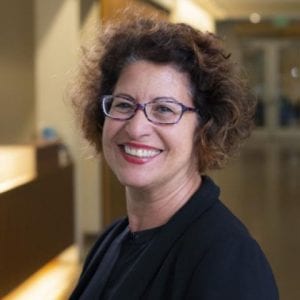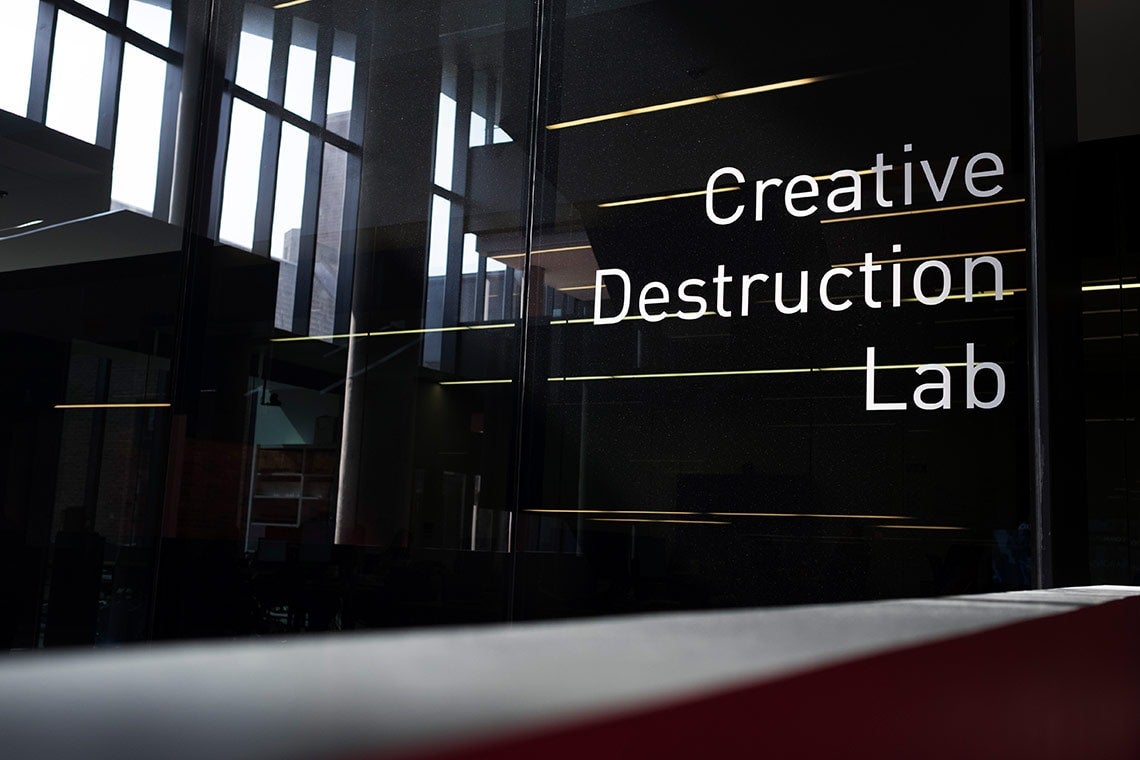5 Questions With UC Davis MBA Admissions Senior Director Andrea Shaw

In our latest installment of the MetroMBA “5 Questions” series, we speak with Andrea Shaw, Senior Director of Admissions at the UC Davis Graduate School of Management. Shaw discusses the tight-knit culture of the UC Davis MBA program, what students can expect, and what qualities define the program.
How does UC Davis help MBA applicants who don’t come from a traditional business or quantitative background?
“Students come to us from across industries, functions, and from around the world. We pride ourselves on being a tight-knit and collaborative community where conversations directly happen between faculty, staff, and students. Our curriculum also allows students to choose between many different career paths especially given the connections we have across other UC Davis schools.
For students coming from a non-business background or who are nervous about starting, we’re a school that really fits. Many schools have 600 students in a full-time program. We only have 50 students. That allows us to personalize the journey of each student.
Also, UC Davis doesn’t believe in just throwing our students into the program. We get to know our students and their needs—what they’re looking for, their strengths, weaknesses, etc. Part of that knowledge comes from our highly robust orientation where we spend almost a month before school starts to really engage with our students.

Andrea Shaw, Senior Director of UC Davis Graduate School of Management Admissions
During orientation, we spend a tremendous amount of time learning about our MBA class. There’s a significant career focus with discussion topics focused on networking, resume building, LinkedIn, etc. However, what the orientation is most known for is helping our students understand their emotional intelligence and develop their story through exercises and experiential learning.
Students have said in surveys that it’s the orientation that solidifies that they’ve made the right decision to come here. Those first few weeks are critical for setting them up for success.”
What type of culture defines UC Davis?
“The two words that continually come up from students, alumni, and faculty are “kind and compassionate.” We are driven toward success, but nice. It’s the idea of compassionate leadership, which research has shown to be necessary for true business growth. We even have an entire series that students can take to develop these skills, including awareness of themselves and others. Kindness and compassion are woven into every aspect of our culture, starting at the top with our dean.
Our culture is also defined by our location in a college town instead of a city. I love Davis as a city, community, and a place to go to college. It’s safe, comfortable, and all the energy revolves around the college.
We’re also really focused on what we do best as a university—biotechnology, sustainability, agriculture. Those sorts of segments and industries are very tied to our culture, university, and research. So, someone interested in Wall Street finance might not fit as well as someone interested in biotech.
Finally, because we’re a small community, you can really stand out. There are not a lot of politics to hold you back. You can get very involved, and there are fewer people vying for the same positions, so you can do as much as you want. This is highly beneficial for students who have a particular passion that they want to explore. For example, I know an MBA student who started a Women in Leadership organization because that was something she was passionate about, and it happened in a few conversations.”
Can you describe the qualities that UC Davis students possess?
“Other than the typical GMAT scores, GPA, and years of work experience, we look for applicants who know what they want to do with their MBA. Candidates should have a focus for the post-MBA career while also remaining open-minded about new opportunities. After all, an MBA is meant to be a transformative experience.
We also look for highly competent individuals who are professional in their verbal and written communications with us. We pride ourselves on being able to find jobs for all our students, so there’s a benchmark we look for—well-rounded students that have many different qualities. Going back to this idea of collaborative and kind, we look for candidates who are good team players and who see the value of working in groups because we have a lot of group work.
Finally, we look holistically at the class and how everyone will learn from each other. We look for a diverse class with students from a wide variety of backgrounds and industries. Everyone should be unique while still representing the essential qualities we love: kindness, compassion, and collaboration.”
If you could give one piece of advice to an MBA applicant interested in UC Davis, what would it be?
“Confidence! So much of what MBAs lack is confidence. The problem is that if you don’t think you can succeed, you won’t.
When you fill out your application and come in for your interview, we want confidence. Confidence is doing your research (knowing UC Davis), knowing who you are, and knowing your story. It’s also about being authentic. All of that leads to being confident in who you are and what you want. That will come across with us; it will come across anywhere.

“Confidence! So much of what MBAs lack is confidence. The problem is that if you don’t think you can succeed, you won’t,” Shaw says.
Remember, first impressions matter. That’s where that confidence helps too. If you come into a situation confidently, those first impressions are strong.”
What is your favorite San Francisco-focused business blog/website?
“I would say for applicants who are looking at schools in the Davis area, Metro-Edge.org is an excellent website. This is a website for young professionals in the Sacramento area. You’ll find events, gatherings, news, and more. It’s really focused on change and responsibility, and that’s great.
I also have to give a little plug to all of our social media accounts. Follow us on LinkedIn, Twitter, and Facebook for the latest news and insights. We also have MBA Showcase days coming up on January 26, February 9, and Feb 23.”
U. Toronto Invests in Rotman Innovation, Data, and Entrepreneurship

Innovation, entrepreneurship, data, and analytics all play significant roles at the University of Toronto’s Rotman School of Management. As a global center for research and academic excellence in business and society, Rotman is known for bringing together diverse views and initiatives. So, it should be no surprise that this month the Rotman School announced increased investment, from different sources, in three areas:
- $25 million in funding for the Creative Destructive Lab (CDL)
- $4 million in new funding for data and analytics initiatives
- $2.5 million to the Creative Destructive Lab Health Stream and additional financial resources in support of the Behavioral Economics in Action at Rotman (BEAR) research center.
Creative Destruction Lab Receives $25 Million

Founded in 2012, the Creative Destruction Lab (CDL) was created to address failure in the market for judgment. As a seed stage program, its goal is to help science-based companies become scalable by pairing founders with experienced entrepreneurs and investors. The nine-month program covers everything from commercialization of products to R&D and maximizing equity-value creation.
To increase the CDLs ability to help young companies, the Canadian government announced a $25 million investment in the program. The investment will allow the CDL to accelerate the commercialization of science in Canada while hopefully also attracting more investment in ventures and more intellectual property. Over four years, the CDL will help more than 1,300 science-based ventures and could create up to 22,000 new jobs.
In a recent press release, Minister Bains says:
“Creative Destruction Lab’s exciting project promises to unleash a new wave of start-up innovation across Canada, creating thousands of middle-class jobs and further securing Canada’s position as a world leader in the AI field. Our government is proud to make investments that will help turn hundreds of innovative ideas into the good jobs and companies of tomorrow.”
The investment will also help the CDL gain insight into the success of science-based startups. In particular, ventures harness new technologies such as AI, energy, health, smart cities, and space and quantum technologies will be targeted. There will also be a boost for young women in science, technology, engineering, and math (STEM) fields in the hopes of inspiring representation in the next generation of business leaders.
“This is a tremendous moment,” Tiff Macklem, Dean at the Rotman School, says. “Thank you Minister Bains, the Government of Canada and everyone that saw the vision and opportunity of the Creative Destruction Lab.”
The investment was made through the Strategic Innovation Fund; a program focused on attracting and supporting high-quality business investments across all sectors of the economy.
$4 Million for Data and Analytics

Data and analytics are an essential area of study at the Rotman School as evidenced by the launch of the new Master of Management Analytics (MMA) program as well as the TD Management Data and Analytics Lab. So, it makes sense that when the TD Bank Group (TD) was looking for a way to support the Rotman School, they decided to give $4 million in funding to explore real-world data and analytics applications.
Christian Nelissen, TD Senior Vice President of Enterprise Data and Analytics, says in a news release:
“Data and analytics are the engines powering the future of Canada’s economy. That new reality means building talented teams that have a deep understanding of the potential of data and analytics, in financial services and beyond. We are looking for visionaries who can see what’s possible—things we might not even have thought of yet.”
Specifically, the funding will go toward development and staffing of the TD Management Data and Analytics Lab, which launched in 2017. The goal of the investment is to improve student development and engagement in data and analytics, and to add expertise and resources for industry projects and cutting-edge analytic thinking. The Lab also offers workshops, hackathons, guest speakers, academic collaboration, and seed funding for the Rotman FinHub.
“By collaborating with TD, we are giving students the opportunity to engage in data-focused problem-solving,” Dean Macklem says. “We know our students are eager to take on new roles in the evolving field of data and analytics and this generous investment will allow us to move more quickly to further expand our data analytics programming and opportunities.”
Investing in Healthcare Innovation & Behavior Economics

Last, but certainly not least, TD Bank Group announced additional investments in two initiatives: innovation in healthcare and behavioral economics.
The first investment from TD is $2.5 million over five years for the Creative Destruction Lab Health Stream, which focuses on biotechnology, bioinformatics, diagnostics, and digital care. This investment will help aspiring entrepreneurs bring technological innovations to the market in the healthcare industry.
Andrea Barrack, TD’s Vice President of Global Corporate Citizenship, says:
“We know that the long-term success of our business depends upon the resilience and health of the people we serve. We’re thrilled to support the CDL with this contribution, which will help accelerate advances in healthcare through fresh thinking and entrepreneurship. At TD, we have a history and meaningful purpose of helping to enrich the lives of customers, colleagues and communities.”
The second investment from TD comes in the form of an agreement to bring additional behavioral finance resources and applications in support of the Behavioral Economics in Action at Rotman (BEAR) research center. As a founding member of BEAR, TD hopes to be able to better examine and research the underlying emotion and behaviors that push financial decision making. Also, the investment will help continue to implement behavioral finance tools into wealth management.
“Being one of the founding members of BEAR will further contribute to TD’s commitment to advancing the study and real-life applications of behavioral finance,” says Dave Kelly, Senior Vice President of TD Wealth. “The work we have done to-date with Rotman has been instrumental in enhancing the advice and services our advisors provide to our clients. Research by BEAR will enable us to better understand the underlying factors that help drive financial decision making so we can connect with our clients on a deeper, more meaningful level.”
What are the Best Healthcare MBA Degrees in Toronto?

The Toronto metro is not only home to a number of the finest business schools in Canada—it is is one of the top cities in North America for healthcare and human health sciences. According to the City of Toronto, the city’s life sciences sector employs nearly 30,000 professional and contributes more than $2 billion to the local economy. In a word, Toronto healthcare is huge.
UCLA Anderson Alumni Profile – Dr. Martine Rosenblatt

It’s clear that MBA education can take you to realms of success you hadn’t imagined, and pursuing your degree with a level of curiosity in a wide variety of fields is a sure way to maximize the value of your degree.
One UCLA Anderson School of Management alumnus, Martine Rothblatt, Ph.D., (MBA, 81) is an inspiring example of the heights one can reach with a high degree of determination and expertise in diverse pursuits. She also serves as a powerful role model for transgendered people in business, and is a fierce advocate of visibility for her community.
Top 5 San Francisco Startups

San Francisco’s current synonymy with startups could not exist without the city’s now mythological history as breeding ground for counterculture of the “tune in, drop out” variety—the antithesis of Silicon Valley, in many respects.
Continue reading…
Alumni Spotlight: UIC Business’ Anna Lisa Somera, MBA/MPH 2006

Meet Anna Lisa Somera — an alumni of the Liautaud Graduate School of Business. She holds an MBA/MPH, which she earned in 2006. After earning a BS Biology and Anthropology and a MS Cellular Biology from Loyola University and Rush University, respectively, and entering into a career in Biotechnology, Somera decided to switch things up and pursue a graduate business degree. Continue reading…
